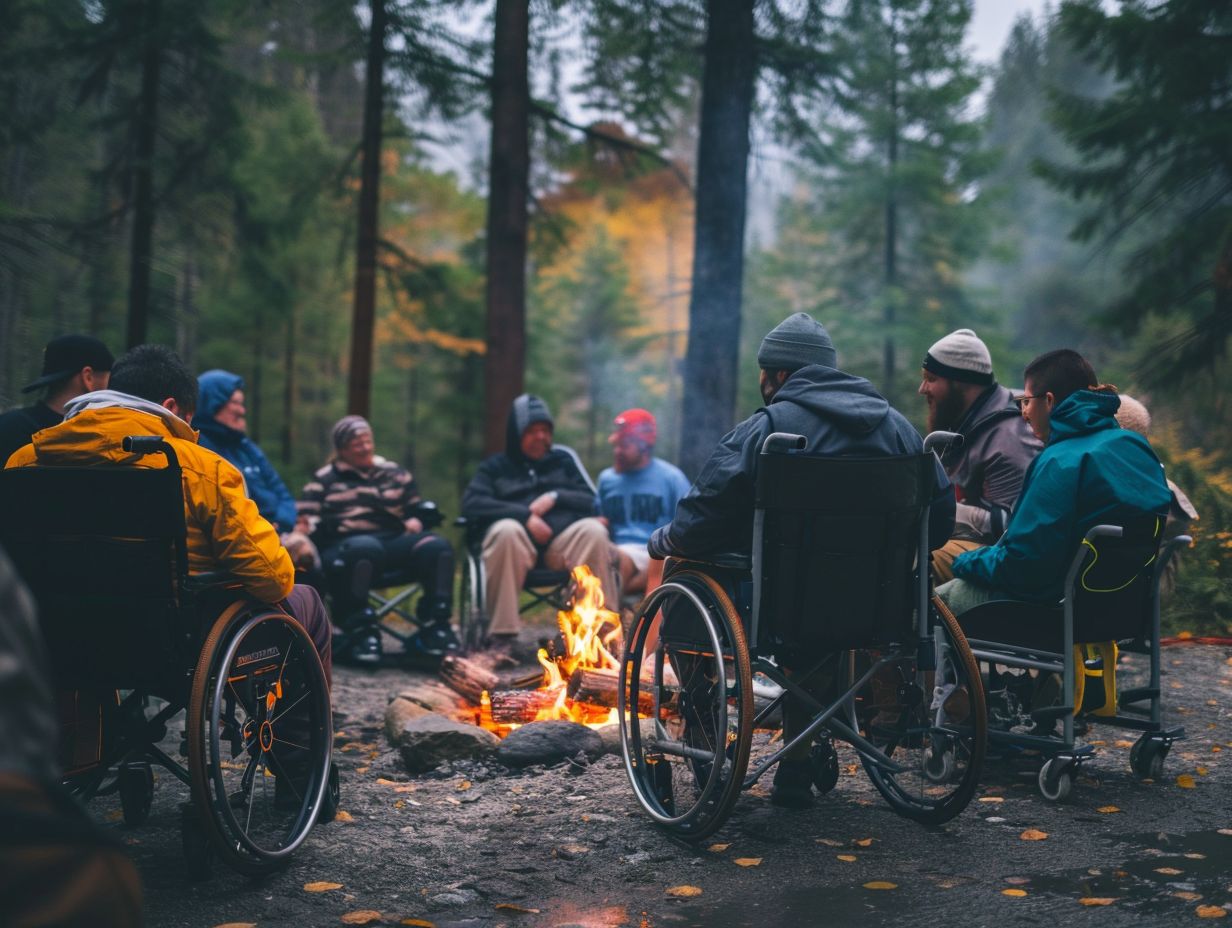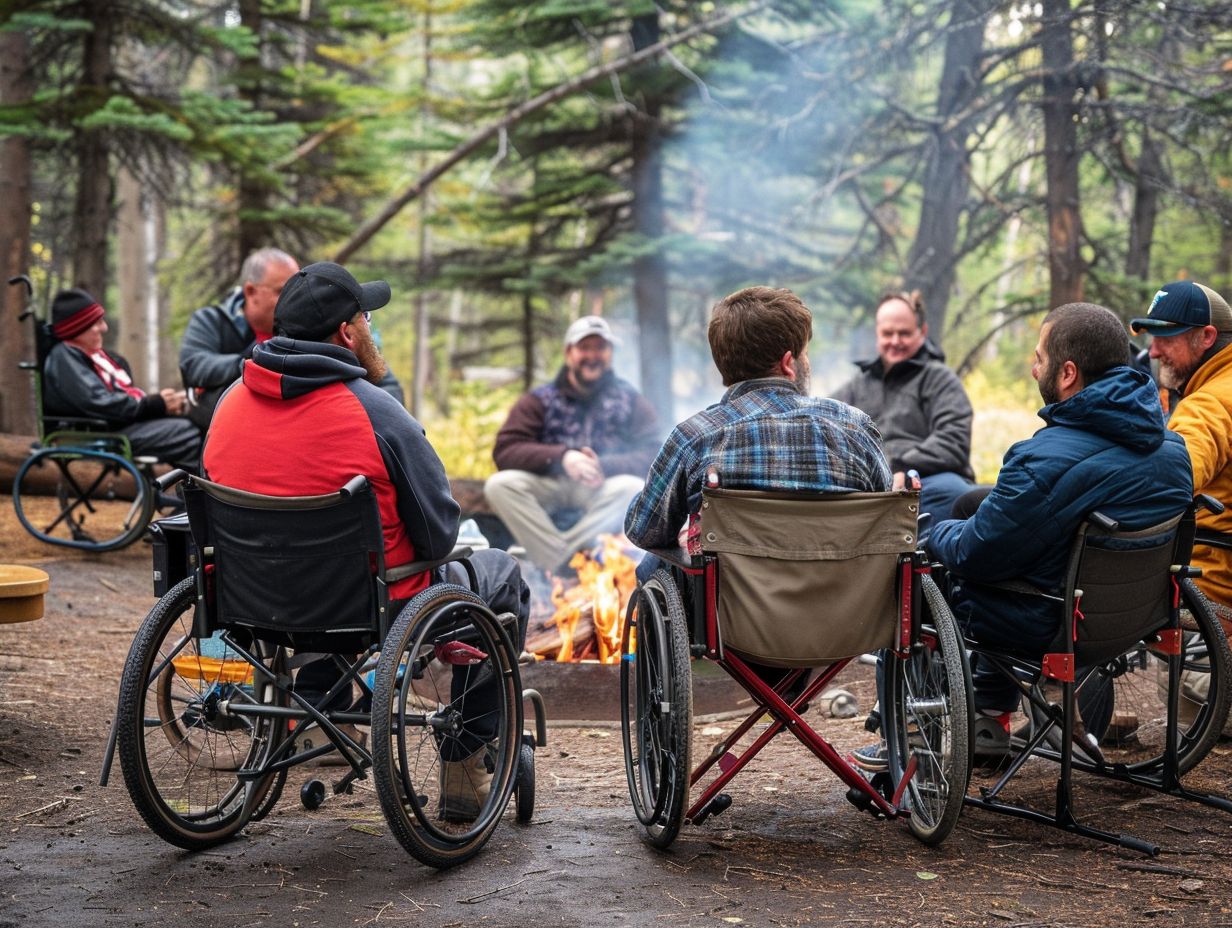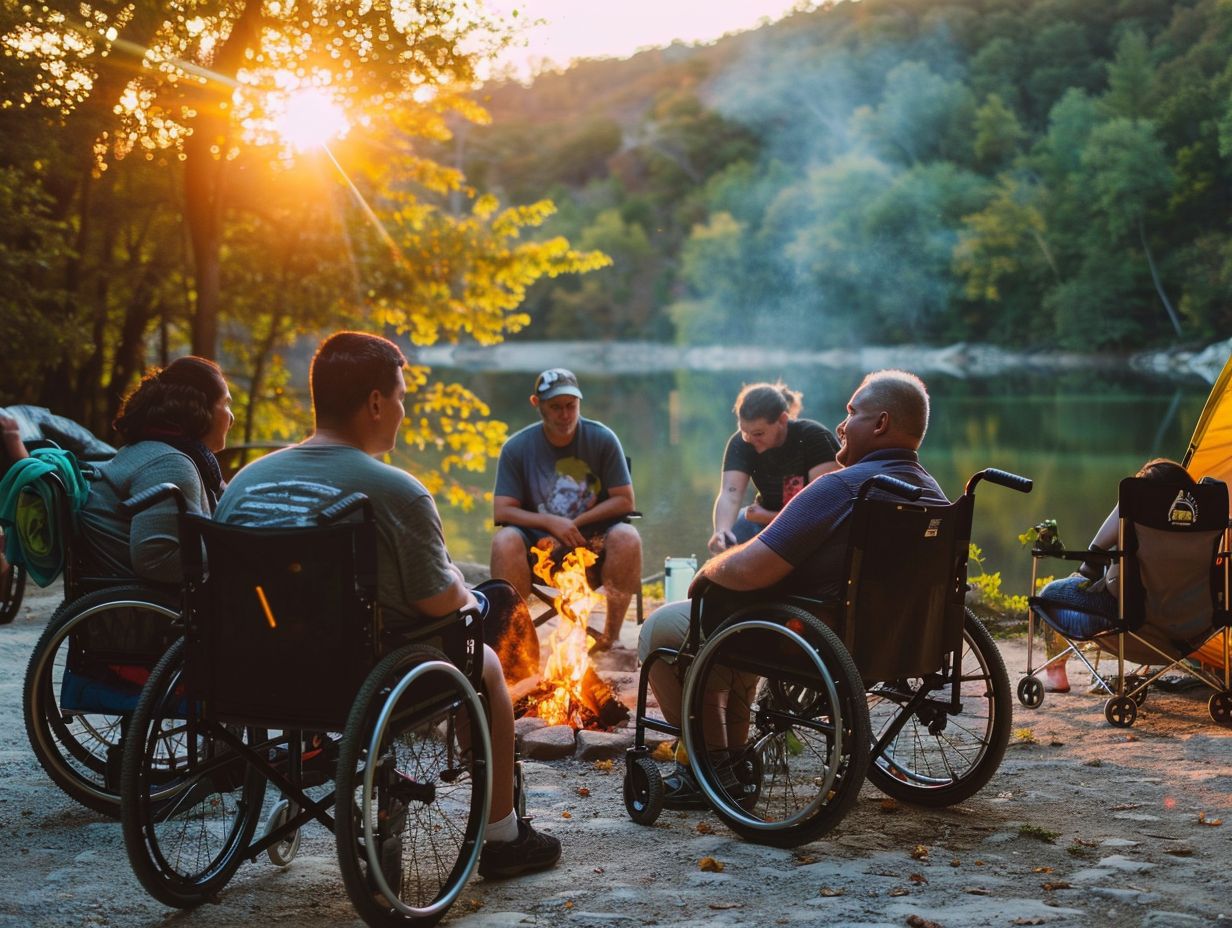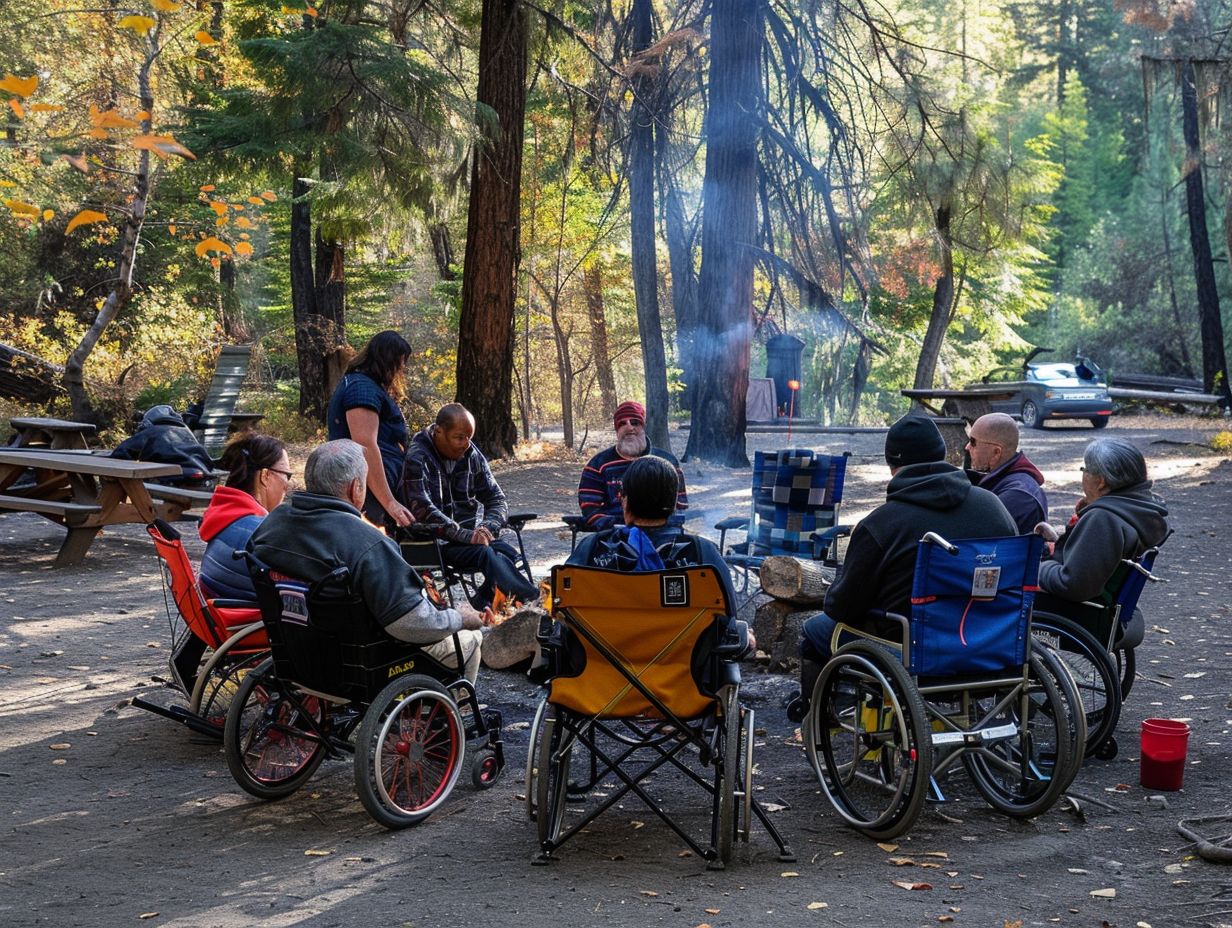If you are a camping enthusiast with a disability or are connected to someone who is, this comprehensive guide will delve into the challenges faced by disabled campers, strategies for campgrounds to enhance accessibility, and recommendations for a fulfilling camping experience.
This guide covers everything from recognizing the requirements of disabled campers to promoting more inclusive alternatives. We invite you to join us as we work towards breaking down barriers and relishing the great outdoors together.
Key Takeaways:

- Make sure to plan ahead and research campgrounds and facilities that offer accessibility for disabled visitors.
- Communication with campground staff is key in ensuring a positive camping experience for disabled individuals.
- By advocating for more inclusive camping options, disabled individuals can break barriers and enjoy the outdoors.
1. Understanding the Needs of Disabled Campers
Understanding the needs of disabled campers involves recognising the unique challenges and requirements faced by individuals with disabilities when engaging in camping activities.
By focusing on empathy, awareness, and inclusivity, campsite staff can better cater to special needs and create a welcoming environment for all campers.
Some disabilities that may impact camping experiences include mobility issues, sensory sensitivities, and cognitive impairments. For instance, individuals with mobility challenges might require accessible trails and facilities, while those with sensory sensitivities may benefit from quieter campsites.
Individuals with cognitive impairments may need clear communication and visual supports to navigate the camping experience effectively.
Inclusive camping practices not only enhance the overall camping experience for everyone but also promote a sense of belonging and community among campers. By understanding and accommodating the diverse needs of disabled individuals, campsites can ensure that everyone can fully enjoy the beauty of the outdoors.
2. Researching Campgrounds and Facilities
When researching campsites and facilities, it is essential to prioritise accessibility features such as wheelchair ramps, barrier-free pitches, and ADA compliance.
By assessing the facilities and services offered at various sites, you can make informed decisions that align with your accessibility requirements.
One important factor to consider when assessing campsites is the availability of accessible toilets and shower facilities. Also, look for designated accessible parking spaces and pathways to ensure easy navigation around the campsite.
Choosing a campsite that provides assistance with pitching tents or accessing recreational areas can greatly improve the camping experience for individuals with different requirements.
Carrying out thorough research through online reviews and interacting with campsite staff can provide valuable insights into the level of inclusivity and accommodation offered at a particular location.
3. Choosing the Right Type of Camping
When selecting the right type of camping experience, you should carefully consider outdoor activities that align with your individual preferences and accessibility requirements.
There are various options available, from backcountry camping to caravan parks, each offering a unique experience that caters to a range of abilities.
Backcountry camping is an excellent choice for those seeking a rugged adventure. It provides opportunities for activities such as hiking, fishing, and wildlife observation in more secluded natural settings.
On the other hand, caravan parks offer a comfortable camping experience with facilities like electricity, water hookups, and organised activities, making it suitable for families and individuals looking for a more leisurely escape.
If you have mobility challenges, opting for cabin camping or designated accessible campsites can ensure a more accommodating experience. When choosing a camping style, it is important to assess your preferences, physical capabilities, and desired level of adventure to find the most suitable option for your outdoor experience.
4. Planning Ahead for Accessibility
Effective planning for accessibility involves considering special needs requirements, conducting accessibility assessments, and ensuring that the necessary accommodations are in place before setting off on a camping trip.
By proactively addressing accessibility challenges, you can enhance the overall experience for individuals with diverse needs.
Training your staff on special needs accessibility is crucial to ensure that they are equipped with the knowledge and skills to effectively support campers with disabilities.
This training should cover topics such as communication strategies, understanding different types of disabilities, and providing assistance with mobility aids.
Conducting thorough accessibility assessments of the campsite is essential to identify potential barriers and make necessary modifications to create an inclusive environment. You should prioritize accessibility to promote diversity and ensure that all campers feel welcome and accommodated.
5. Packing Essential Medical Supplies
When preparing for a camping trip with disabilities, it is essential to pack necessary medical supplies to ensure access to vital medications, equipment, and aids. To effectively address potential health concerns and emergencies, campers must assemble a comprehensive medical kit tailored to their individual needs.
Including items such as adhesive plasters, antiseptic wipes, dressings, and tweezers in the medical kit can assist in managing minor injuries. Properly packaging important medications in their original containers, along with copies of prescriptions, is a critical step.
Campers should organise their medical supplies in clear, labelled pouches to facilitate easy access. Additionally, including information about existing health conditions and emergency contacts in the kit is beneficial.
Ensuring proper storage for medications, particularly those needing refrigeration, and devising a plan for the appropriate disposal of medical waste are crucial elements for maintaining a safe camping experience.
6. Communicating with Campground Staff
Effective communication with campsite staff is essential for you as a camper with disabilities to convey your specific requirements, seek assistance when needed, and ensure a smooth camping experience.
By fostering open dialogue and collaboration, you can work together with staff to address accessibility concerns proactively. Having clear lines of communication enables you to advocate for your individual needs, allowing staff members to better understand how to support you effectively.
When you openly communicate your preferences and challenges, it facilitates a more inclusive camping environment where everyone feels heard and valued. Establishing these inclusive communication channels not only benefits campers with disabilities but also enhances the overall camping experience for all participants.
7. Making Accommodations for Mobility Challenges

Accommodating mobility challenges involves selecting campsites or facilities with wheelchair accessibility, smooth terrain, and adequate facilities to support individuals with limited mobility. By choosing appropriate accommodation and considering mobility aids, you can overcome barriers and enjoy a comfortable camping experience.
Ensuring that campsites are equipped with barrier-free facilities such as accessible toilets, designated parking spaces, and level camping pitches is crucial for ensuring a smooth experience for those with mobility limitations.
Seeking out campgrounds with paved paths, well-maintained trails, and close proximity to essential amenities can significantly enhance the camping trip for individuals requiring mobility assistance.
Adapting camping activities by opting for shorter walks, engaging in nature observation from designated accessible areas, and investing in specialised camping equipment like all-terrain wheelchairs can make the outdoor adventure more inclusive for everyone.
8. Considering Specialised Camping Equipment
When considering specialised camping equipment tailored to specific needs, you can significantly enhance the comfort, safety, and accessibility of campers with disabilities.
The selection of adaptive gear, such as wheelchair-friendly tents, all-terrain wheelchairs, and accessible sleeping bags, is crucial for individuals with mobility impairments.
Additionally, for those with visual impairments, the use of braille maps and audio devices can greatly improve navigation during camping trips. Specialised cooking utensils, grips, and tools can also be valuable for campers with limited dexterity or strength.
In the process of choosing camping accessories, it is advisable to opt for lightweight, durable options that are easy to set up and use. Prioritising equipment that is versatile and adaptable to accommodate various needs and preferences is key to ensuring a positive camping experience for individuals with disabilities.
9. Creating a Support System
Creating a support system that includes friends, family, or carers is crucial for campers with disabilities to receive the assistance, encouragement, and companionship needed during outdoor adventures. By cultivating a network of support, individuals can overcome challenges and derive fulfilment from the camping experience.
The presence of emotional and practical support is instrumental in enableing campers with disabilities. Recognising the distinct needs and capabilities of each person is key to establishing a supportive atmosphere.
Promoting open communication and trust within the group can cultivate a sense of inclusion and understanding. Shared outdoor experiences not only foster camaraderie but also bolster confidence and resilience. Engaging in group activities allows campers to learn from one another and create enduring memories that contribute to their overall well-being.
10. Understanding and Respecting Campground Rules
Understanding and respecting campsite rules is essential for all campers, including those with disabilities, to ensure a harmonious and safe environment for everyone. Adhering to regulations, demonstrating respect for nature, and promoting inclusivity are ways in which you can contribute to a positive camping community.
Consideration for fellow campers, such as keeping noise levels low during quiet hours and maintaining a tidy campsite, not only improves the overall experience for all but also helps foster a sense of community.
Being mindful of wildlife habitats, proper rubbish disposal, and conserving resources like water and firewood not only benefits the environment but also sets a responsible example for others.
Embracing diversity in the camping community through open-mindedness and building friendships across different backgrounds enriches the collective camping experience and cultivates a culture of inclusivity and understanding.
11. Staying Safe and Prepared for Emergencies
Ensuring safety and preparedness for emergencies is essential for all campers, particularly those with disabilities, to proactively manage risks and effectively handle unforeseen circumstances.
By formulating emergency strategies, carrying necessary provisions, and staying informed, campers can optimise their safety and well-being during camping trips. Customising safety protocols to cater to individual requirements is imperative.
For campers facing mobility limitations, guaranteeing the availability of accessible pathways and amenities is crucial. Establishing a support network and maintaining clear lines of communication can facilitate prompt actions in case of emergencies.
When devising emergency protocols, it is vital to take into account considerations such as medical conditions, communication preferences, and any essential accommodations.
Moreover, acquainting oneself with the layout of the campsite and the locations of nearby medical facilities is prudent. Demonstrating adaptability and proactivity in evaluating and mitigating potential risks can help avert crisis scenarios and ensure a more pleasant camping experience for all individuals involved.
12. Exploring Accessible Outdoor Activities
Exploring accessible outdoor activities allows campers with disabilities to engage in inclusive and enriching experiences that cater to diverse abilities. From accessible trails to wheelchair-friendly campsites, you can enjoy the natural beauty and recreational opportunities offered by outdoor destinations.
Popular wheelchair-accessible trails include paved paths through lush forests or along tranquil lakeshores, providing a peaceful environment for all visitors to appreciate. These trail options offer a chance for individuals of varying abilities to immerse themselves in nature and connect with the outdoors.
Inclusive outdoor recreation fosters a sense of community and belonging, highlighting the importance of creating spaces that welcome everyone to participate and enjoy the benefits of nature.
13. Educating Others on Disability Awareness
Educating others on disability awareness fosters a culture of inclusivity, empathy, and understanding towards individuals with disabilities in camping and outdoor settings.
By raising awareness, sharing experiences, and promoting acceptance, campers can contribute to a more inclusive and supportive outdoor community.
This culture of inclusivity not only benefits individuals with disabilities but enriches the overall camping experience for everyone involved. Creating an environment where all campers feel welcomed and valued allows for connections to be made, friendships to bloom, and a sense of belonging to be fostered.
To promote disability awareness in outdoor environments, resources such as guides, training materials, and workshops are invaluable. These tools provide insights, tips, and strategies for creating accessible and accommodating spaces that cater to diverse needs and abilities.
14. Advocating for More Inclusive Camping Options

Advocating for more inclusive camping options involves championing accessible amenities, staff training on special needs accessibility, and policy development that prioritises inclusivity.
By advocating for change and promoting awareness, you can drive positive shifts towards a more accommodating and welcoming camping environment.
One key area where camping facilities can improve inclusivity is by offering braille signage and tactile maps for visually impaired campers. Providing designated quiet spaces or sensory-friendly areas can cater to campers with sensory sensitivities.
Staff training that focuses on empathy, communication, and understanding diverse needs can greatly enhance the overall camping experience for individuals with disabilities.
Implementing clear policies that address accommodation requests and ensure equal opportunities for all campers is essential for fostering an inclusive environment.
Encouraging campers to share their experiences and advocate for inclusive outdoor experiences can spark a collective effort towards creating more accessible and welcoming camping destinations.
15. Enjoying the Outdoors and Breaking Barriers
For campers with disabilities, the outdoors offer not just a recreational escape but a platform for personal growth and enablement through inclusive camping experiences. Embracing challenges and fostering a sense of community, individuals can find joy and connection in nature while overcoming obstacles.
Participating in outdoor adventures allows campers to showcase their abilities, leading to a sense of achievement and heightened self-esteem. Engaging in activities like hiking, kayaking, and teamwork tasks enables individuals to develop resilience, independence, and a profound appreciation for the natural environment.
The camaraderie built during inclusive camping experiences creates a supportive atmosphere where each person’s unique skills are valued. The impact of these inclusive programmes is profound, instilling confidence and happiness that extend beyond the camping trip.
By providing a space for campers to shine and thrive, inclusive camping experiences contribute to personal growth and lasting positive change in participants’ lives.
What Are the Most Common Barriers for Disabled Campers?
When disabled campers visit, they often encounter common barriers like inadequate campsite accessibility, a lack of special needs facilities, and insufficient staff training in disability awareness.
To enhance the camping experience for individuals with disabilities, campsites should consider implementing a range of strategies.
This may involve investing in accessible paths, ramps, and facilities to facilitate easy navigation for campers with mobility limitations. Providing specialised equipment hire, such as adaptive camping gear or wheelchair-accessible lodges, can significantly improve comfort and convenience.
It is essential to educate staff members on disability etiquette and effective communication practices to create a supportive and welcoming environment for all campers. By addressing these challenges and promoting inclusivity, campsites can establish a positive and enriching experience for individuals of all abilities.
How Can Campgrounds Improve Accessibility for Disabled Visitors?
Campsites can enhance accessibility for disabled visitors by implementing wheelchair-accessible facilities, providing sensory-friendly spaces, and offering staff training on special needs accommodation.
By prioritising inclusivity, embracing universal design principles, and engaging with disabled communities, campsites can create a more welcoming and accommodating environment for all visitors.
This proactive approach not only ensures that individuals with disabilities can fully enjoy the outdoor experience but also demonstrates a commitment to diversity and inclusion.
Offering amenities such as accessible paths, designated parking spaces, and ADA-compliant toilets can significantly improve the overall camping experience for disabled guests.
Ongoing staff training plays a crucial role in fostering empathy, understanding, and responsiveness to the needs of diverse visitors. By cultivating a culture of inclusiveness and respect, campsites can set a positive example within the outdoor recreation industry.
What Are Some Tips for Disabled Campers to Have a Positive Experience?
You can enhance your camping experience by planning ahead, effectively communicating your needs, and selecting campsites with suitable accessibility features.
Proper preparation, interacting with supportive staff, and embracing outdoor opportunities can help you enjoy a fulfilling and positive camping experience that aligns with your abilities and preferences.
Discussing any specific requirements or accommodations with campsite staff in advance can ensure a smoother experience upon your arrival. It is important to clearly communicate your needs, whether they are related to wheelchair access, level camping pitches, or proximity to facilities.
Researching campsites that prioritise inclusivity and provide accessible trails, toilets, and facilities can significantly improve the camping experience for individuals of all abilities. This proactive approach can enable you and boost your confidence during your outdoor adventures.
How Can the Outdoors Be Made More Inclusive for All Abilities?
Enhancing inclusivity in outdoor spaces for all abilities involves designing accessible trails, providing sensory-friendly experiences, and creating barrier-free campsites that cater to diverse needs.
Embracing universal design concepts, fostering a culture of acceptance, and prioritising accessibility are key steps in making outdoor areas welcoming and enjoyable for individuals with various abilities.
To assist visually impaired individuals in navigating their surroundings independently, consider implementing tactile signage along the trails. Creating quiet zones or offering noise-cancelling headphones can help create a calming environment for those sensitive to sound.
Organising inclusive events, such as nature walks tailored for wheelchair users or sensory-friendly camping trips, can encourage participation from a wider range of community members. By incorporating these strategies, outdoor spaces can truly become inclusive and accessible to all.
What Are the Benefits of Accessible Camping for Disabled Individuals?
Accessible camping offers disabled individuals like yourself the opportunity to connect with nature, build confidence, and enjoy recreational activities in a supportive and inclusive environment.
By providing equal access to outdoor adventures, fostering independence, and promoting social interaction, accessible camping can significantly enhance your well-being and quality of life.
Being able to navigate the great outdoors can be a life-changing experience for many, offering you a sense of freedom and enablement.
Testimonials from participants often highlight the positive impact of inclusive camping, noting how it helps them feel more connected to the world around them and boosts their overall sense of well-being.
The transformative power of accessible camping goes beyond the physical benefits; it also plays a crucial role in improving mental health by reducing stress and anxiety, promoting relaxation, and fostering a sense of accomplishment through shared experiences.
Frequently Asked Questions

1. Can disabled visitors have equal access to camping facilities and activities?
Yes, camping accessibility for disabled visitors is an important aspect for many campgrounds. Efforts are made to ensure equal access to facilities and activities for all visitors, regardless of their disabilities.
2. What types of accommodations are available for disabled visitors at campgrounds?
There are a variety of accommodations available for disabled visitors, such as wheelchair-accessible campsites, accessible restrooms and showers, and paved paths for easier navigation. Some campgrounds also offer golf carts or other transportation for visitors with mobility issues.
3. Are there special permits or reservations required for disabled visitors?
No, there are generally no special permits or reservations required for disabled visitors. However, it is recommended to contact the campground beforehand to inquire about any specific needs or accommodations.
4. Are service animals allowed at campgrounds for disabled visitors?
Yes, service animals are allowed at most campgrounds for disabled visitors. However, it is important to check with the specific campground beforehand to ensure their policies and guidelines regarding service animals.
5. Do campgrounds offer any activities for disabled visitors?
Many campgrounds offer a range of activities that can be enjoyed by disabled visitors, such as accessible hiking trails, fishing piers, and nature programs. It is best to check with the campground beforehand to see what activities are available.
6. Are there any resources available for planning a camping trip for disabled visitors?
Yes, there are several resources available to help plan a camping trip for disabled visitors. The National Park Service has an accessibility guide for all national parks, and organizations like Accessible Adventures provide information on accessible campgrounds and outdoor activities. Additionally, many campgrounds have specific information on their websites regarding accessibility for disabled visitors.



